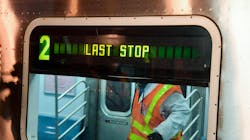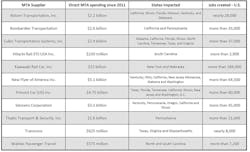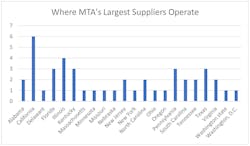New York MTA puts 11 suppliers on notice that contracts are in jeopardy
New York Metropolitan Transportation Authority (MTA) sent letters to 11 of its largest suppliers, with whom it has spent a combined $39.08 billion since 2011, notifying them current and future contracts are at risk due to the financial impacts of the COVID-19 pandemic.
The suppliers operate facilities in 21 states and Washington, D.C., where, combined, nearly half a million workers are employed. MTA says its direct capital spending during the past nine years has created close to 100,000 jobs nationwide including at medium and smaller MWBE firms.
The loss of revenues is compounded with the declining credit rating, which makes it more expensive for MTA to borrow money. MTA reports the Transportation Revenue Bond, its core credit, has been downgraded five times since March and continues to carry a negative outlook from all four rating agencies.
The authority has joined a larger effort within the transit industry among transit agencies of various sizes, private business firms and associations to request at least $32 billion in federal aid for transit systems. MTA says it needs $12 billion.
"The COVID-19 pandemic has exacted a horrific toll in human, social and economic terms across the nation,” MTA Chairman Pat Foye wrote in the letters to suppliers. “I am writing to alert you that because of this financial devastation, many current and all future contracts are in jeopardy without an injection of $12 billion in emergency federal aid. Let me be clear: federal funding for mass transit isn’t a red or blue issue – it’s a jobs issue.”
Unfortunately, MTA has plenty of company in its plight.
Earlier this week, the American Public Transportation Association (APTA) released the results of membership surveys conducted early in September. Of the association’s transit agency members, 61 percent are considering service cuts, while eight in 10 large agencies are considering service cuts to bridge funding gaps.
APTA also surveyed its business members and found 86 percent of businesses have seen a reduction in their transit industry business due to the impacts of the pandemic and more than one-third of these businesses have already furloughed employees. More than one-third of business members surveyed feared their businesses would not survive the pandemic.
However, the authority is prepared to implement additional steps to ensure its survival.
“In the face of federal inaction, the MTA is preparing for drastic and necessary reductions that include possible service cuts of up to 40 percent on subways and up to 50 percent on the Long Island and Metro-North railroads – measures that would have a profound negative impact on mobility in the New York Metropolitan region,” said the authority.
A fare hike and the potential to lay off more than 8,000 workers are also being considered.
“Without an immediate injection of $12 billion, the MTA will be forced to make draconian cuts that will reverberate throughout the entire economy,” said the authority.
About the Author

Mischa Wanek-Libman
Group Editorial Director
Mischa Wanek-Libman is director of communications with Transdev North America. She has more than 20 years of experience working in the transportation industry covering construction projects, engineering challenges, transit and rail operations and best practices.
Wanek-Libman has held top editorial positions at freight rail and public transportation business-to-business publications including as editor-in-chief and editorial director of Mass Transit from 2018-2024. She has been recognized for editorial excellence through her individual work, as well as for collaborative content.
She is an active member of the American Public Transportation Association's Marketing and Communications Committee and served 14 years as a Board Observer on the National Railroad Construction and Maintenance Association (NRC) Board of Directors.
She is a graduate of Drake University in Des Moines, Iowa, where she earned a Bachelor of Arts degree in Journalism and Mass Communication.


